As you may have read from some of our past training articles about the puppy imprint period, you know the time frame is from 6 to 16 weeks old. Why? Because six weeks old is when the puppies' personalities begin to develop, and they begin truly exploring their world.
During this period, puppies are super responsive to learning patterns. Getting them started on the pattern of working for their people and learning that people are going to ask things of them is incredibly important.
At eight weeks, a puppy can begin remembering what they've learned. So, what can a puppy learn in four weeks?
Puppies learn their name so that when you call them, they'll turn toward you (focus), and then you can call the command you wish them to follow. In these earliest stages, puppies will learn these four (4) basic commands.
-
Learning to respond to their name and to look at you when called
-
Come
-
Sit
-
Leave It
Nova training
Beyond the commands, puppies will begin to get familiar with
Words such as ‘good boy,’ ‘good girl,’ ‘good,’ and 'leave it’.
How to follow lures and accept ‘kibble’ as treats.
Crate-training:
Let us lose sleep, so you don't have to! This teaches the puppy they can be alone and is their first experience away from their litter. During Crate-training, your puppy will learn
- To go into their crate on command
- They will be in and out of their crates multiple times daily.
- To be quiet in the crate
- Potty Training - Potty and house-training are not the same as crate-training and require additional hours, particularly in the first 2 weeks of training.
Yielding to the leash:
Our puppies are familiar with collars from the age of four weeks as that's what we use to identify them so our families can tell them apart as they receive pictures and videos each week.
But add a leash to that?
Your puppy's instinct will be to pull, which you don't want. So, in these early days, the puppy will begin to understand the feel of the leash attached to their collars. While no puppy is completely leash trained at twelve weeks old, they have a solid foundation to understand what to do when it's on.
We will begin to work with your puppy on learning to walk on a leash properly, though it will take longer than four weeks. The skills they learn in the proctored basic puppy training program to walk on a leash will take continued practice once they get to their new home.
Who's Doing the Work?
Our On-site Trainer is David Miller, and his children. The entire family is involved in the training on a daily basis in which the puppies learn to work with younger children and adults. At his place, the puppies will receive additional socialization from children of all ages and get introduced to a home environment.
Our proctor is Steve Haynes of Dogspecialist.com, Canine Design Group, and FidelioWorks Canada. Steve has been working with dogs for over 50 years and has trained dogs all over the world.
Every week, twice to three times per week, you’ll receive video updates, detailed documentation of your pup’s progress, and comments from the proctor trainer.
Steve and David will meet twice a week to review your pup's progress, review videos, and send them to you by email or text so you can follow along. In addition, Steve will send you detailed updates about your puppy's progress.
Included vaccinations and meds in the training program:
At twelve weeks old, the puppies in training will receive their rabies shots and second puppy immunizations. Before these final shots, puppies receive all deworming, other parasitic treatments, and other medications as needed.
Puppies are fed a healthy diet on a regular schedule. We currently feed NutriSource and every puppy receives a sample bag of puppy food at pick up or delivery along with their health record within their puppy folder, and vet check.
The rabies tag and paperwork are completed when your puppy in training turns twelve weeks old.
The Golden Cavaliers Promise:
Our goal has always been to offer a healthy, happy puppy that makes a wonderful pet for your family.
A Note about Service Dogs:
We've received a lot of requests about training for service dogs and have chosen to focus on basic puppy training for the time being. Service dog trainers will tell you that over ninety percent of dogs entered into their programs 'wash out,' and determining before eight weeks if a puppy might succeed in their program is impossible.
*****




